 Petzlover
PetzloverBull and Terrier is originated from United Kingdom but Carpatin is originated from Romania. Bull and Terrier may grow 23 cm / 9 inches shorter than Carpatin. Bull and Terrier may weigh 58 kg / 127 pounds lesser than Carpatin. Both Bull and Terrier and Carpatin has same life span. Both Bull and Terrier and Carpatin has almost same litter size. Both Bull and Terrier and Carpatin requires Low Maintenance.
The Bull and Terrier is a blend between a number of Old English Terriers and the Old English Bulldog. It is believed that this extinct dog was the start of breeds such as the American Pit Bull Terrier and the Staffordshire Bull Terrier.
They were excellent for hunting rats and weren’t a true breed. The dog was popular in the British Isles and in the United States in the 19th Century. They became rare as different varieties of Bull and Terrier were bred and standardized.
Most terriers have a good deal of Old English Bulldog blood in them so as to provide them with the courage to fight and hunt prey, while the English Terrier blood provided a feisty temperament and longer legs for speed.
Around 1860, the Bull and Terrier breed split into 2 categories – the pure white Bull Terrier and the ones of color. The Bull and Terrier was never recognized as a standardized breed by any of the kennel clubs.
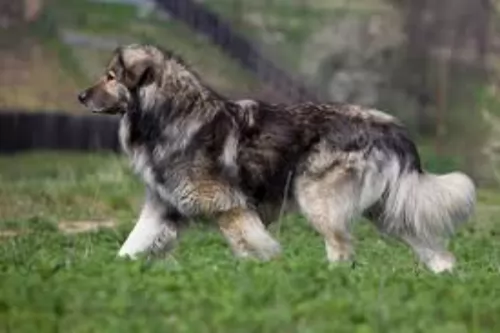 The Carpatin, known also as the Carpathian Shepherd Dog or Romanian Shepherd, is a large breed dog known for his guarding- and watch-dog abilities. Information about these dogs dates back to the 1800s, and much later, in March 1998, fans of the dog founded the Carpathian Shepherd Dogs Club.
The Carpatin, known also as the Carpathian Shepherd Dog or Romanian Shepherd, is a large breed dog known for his guarding- and watch-dog abilities. Information about these dogs dates back to the 1800s, and much later, in March 1998, fans of the dog founded the Carpathian Shepherd Dogs Club.
It is believed that the different Carpathian Shepherd Dog breeds are descendants from dogs that were developed thousands of years ago in Mesopotamia. Documentation of the origins of the dog are rare but it is thought that they are probable descendants of Lupomolossoids. However in 2005, it was finally recognized by the Federation Cynologique Internationale, and in 2006, it was recognized by the United Kennel Club. However, it is still a rare breed outside Romania.
There isn’t too much detail and information on the Bull and Terrier but we can be sure that with the cross between the Old English Bulldog and the Old English Terrier, he would have been a small to medium sized compact, muscular dog, standing roughly between 38cm to 50cm in height and weighing anything in the region of 11 to 22kg.
He would have had a big head, and most of the dogs had a medium to long tail. His coat was of many colors such as white, fawn, tan or brindle and would have been short and smooth.
As far as temperament goes, the Bull and Terrier would certainly be courageous, feisty, independent, strong and energetic. Socialization wasn’t available in those days but with training, this intelligent breed would be affectionate with his human family.
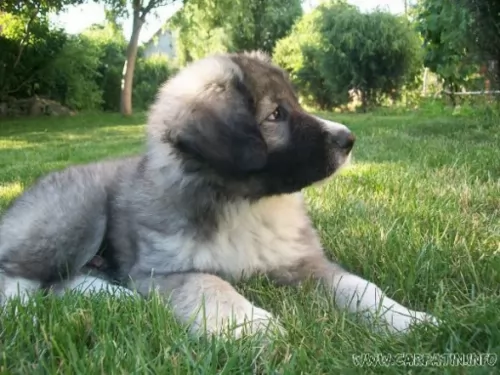 The Carpatin is a large breed dog, standing at 65 to 73cm in height and weighing between 32- and 80kg. The skull of the dog is wide and domed, the ears medium set and floppy. The neck is strong and muscled, the legs strong and straight, the chest deep.
The Carpatin is a large breed dog, standing at 65 to 73cm in height and weighing between 32- and 80kg. The skull of the dog is wide and domed, the ears medium set and floppy. The neck is strong and muscled, the legs strong and straight, the chest deep.
The tail of the Carpatin is long, bushy and high set and his coat is double layered, medium length and pale fawn in color with light grey to black shades being seen as well.
The Carpatin is patient, loving and protective. This is a strong-willed dog who is independent and fairly easy to train as he is intelligent.
It is a good idea to have him trained and socialized as this brings out the best in him. He is a patient and affectionate dog and he’ll get on well with children and tolerate other pets in the home.
They are wary of strangers and become vocal, barking and growling and taking their guard dog role seriously with strangers around.
Nobody seems to be 100% sure when the classic Bull and Terrier dog became extinct but it is strongly assumed that it was some time between 1890 and 1920.
People believe that there are actually surviving breeds that could be considered Bull and Terriers. One thing is sure, when you consider that the Bull and Terrier is actually made up of several breeds such as the Bull Terrier, the Staffordshire Bull Terrier, Boston Terrier and American Pit Bull Terrier then you can imagine the character of the dog – brave, hardy, intelligent, feisty, bold, confident and fearless. He was a dog who loved his human family and would have been both friend and protector.
These dogs have been popular around the world, and have had a strong influence in the development of a number of other breeds. Even today, breeders are always looking at ways to develop new breeds based on the descendants of the Bull and Terrier.
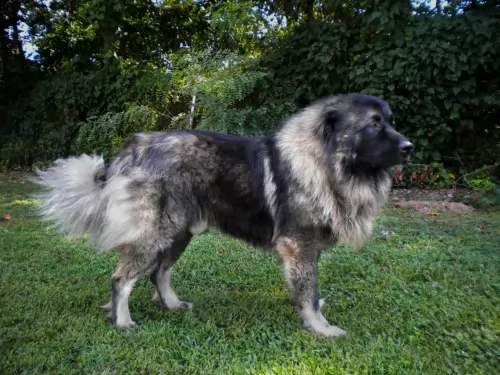 The Carpatin is a big, independent dog who loves his human family. He will guard them too and has all the intelligence and skills to be instinctively alert to danger. Territorial, he makes an excellent watchdog.
The Carpatin is a big, independent dog who loves his human family. He will guard them too and has all the intelligence and skills to be instinctively alert to danger. Territorial, he makes an excellent watchdog.
He isn’t too social around strangers, but with training and socialization he becomes more relaxed and amicable. He responds well to training, especially when he has a firm, strong handler and owner.
Used to being a herding- and working dog, he is happiest when kept busy and isn’t a dog to use essentially for guarding only as he can become aloof and aggressive. Treat him well and have him trained and socialized and you’ll have a wonderful guardian and companion.
The Bull and Terrier was no doubt a robust breed with few health issues. However his owners of that time would have had to be aware of eye diseases such as cataracts that could have lead to blindness.
Other health issues they would have had to contend with would have been hip and elbow dysplasia, a disease which can cause lameness in a dog accompanied with pain. Because the Bull and terrier was mixed with the English Bulldog, the dog owners would have had to be aware of respiratory health problems, as the Bull dog is a breed that is susceptible to these problems.
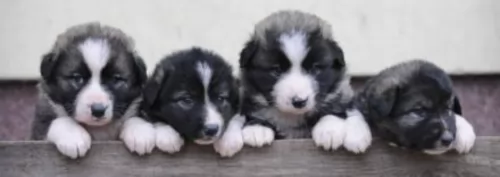 The beautiful Carpatin dog can live to be a healthy 12-14 years if you feed him nutritious foods, provide him with clean water every day, exercise him, give him a dry, warm bed and give him loads of love, attention and care.
The beautiful Carpatin dog can live to be a healthy 12-14 years if you feed him nutritious foods, provide him with clean water every day, exercise him, give him a dry, warm bed and give him loads of love, attention and care.
However every dog can become ill and with the Carpathian Shepherd Dog you certainly want to be aware of ear and eye infections, hip dysplasia and skin disorders.
Long ago the Bull and Terrier was developed to be a hunting dog, and because he was a blend of the English Bulldog and Terriers such as the Staffordshire Bull Terrier and English Terrier, he no doubt had a short coat that would have required being brushed down from time to time.
The Bull and Terrier dog was bred for hunting, and he would have in all likelihood have caught some of his own food. He would therefore have got a lot of protein in. His owners would also have fed him some of their own food too which would have been eggs, home-made bread, rice, fresh vegetables and meat.
He would have had a good quota of raw meat in his diet too and this would have ensured that his coat was shiny and glossy, free of rashes. Dogs such as the Bull and Terrier wouldn’t have eaten commercially produced kibble as that was only introduced in the 1930s.
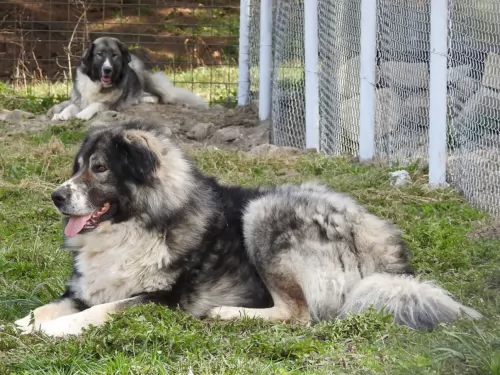 Despite his longish coat, the Carpatin is a low to moderate maintenance dog. To avoid tangles and matting, you’ll need to brush his hair at least twice a week. He won’t however require professional grooming.
Despite his longish coat, the Carpatin is a low to moderate maintenance dog. To avoid tangles and matting, you’ll need to brush his hair at least twice a week. He won’t however require professional grooming.
Dogs with floppy ears will need to have the ears checked to ensure they remain fee of moisture and wax buid-up. The ears can be easily infected when left uncleaned. The nails and teeth should also be checked. Canine toothpaste and brush can help to prevent plaque build-up which can cause gum disease and tooth decay. Not only that, dental disease can lead to other health issues in other parts of the body.
The Carpatin is a medium- to high energy level breed dog and he will therefore need a good amount of exercise to keep him healthy and content. Rope him in to your activities whether you go jogging or cycling. Put him on a leash and take him with – he’ll love it. Dogs who are allowed to be active and part of the family are simply better dogs.
Your Carpatin’s weight, age and activity levels will guide you as to what food is best for him. He needs nutritious food and if you’re unsure how to choose, your veterinarian can advise you on what to look for.
Apart from proteins, your dog needs fats, fiber, carbohydrates, minerals and vitamins. As your dog ages, he or she will go through different life stages, and you want to be sure of ensuring your dog is getting everything he needs to ward of disease and stay happy and healthy.
Make sure your 4-legged canine friend always has a bowl of fresh, cool water available to him.